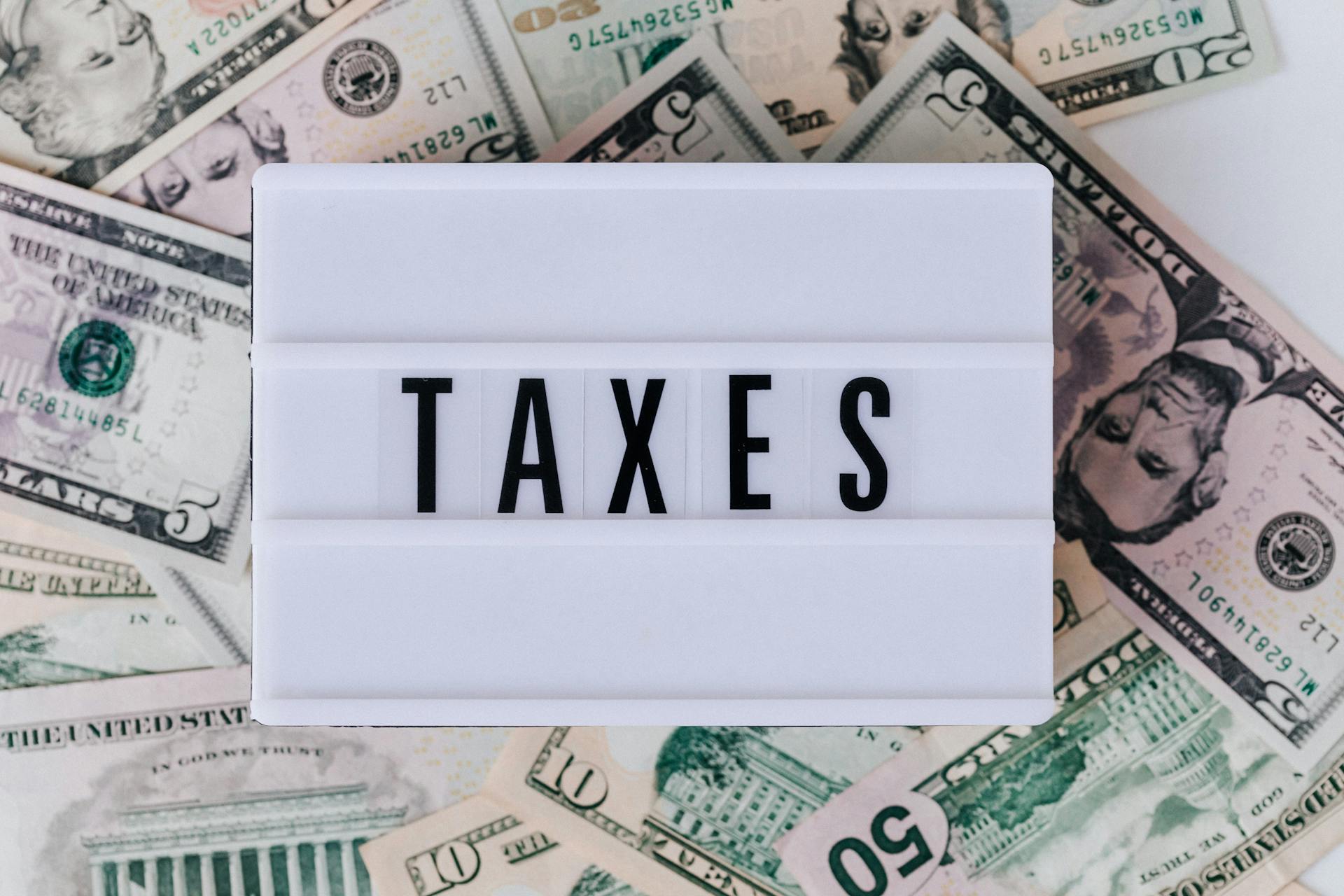
A 1031 exchange from commercial to residential property can be a great way to diversify your investment portfolio. You can defer paying capital gains taxes on the sale of a commercial property by reinvesting the proceeds in a residential property.
To qualify for a 1031 exchange, the commercial property must be held for investment or used in a trade or business, and the residential property must be a like-kind exchange. This means the properties must be of the same type and used for the same purpose.
The IRS sets a deadline of 180 days to complete the exchange, starting from the date of the commercial property sale. This timeline can be challenging, so it's essential to plan ahead and work with a qualified intermediary.
If this caught your attention, see: Is 1031 Exchange Only for Investment Property
Criteria for Success
To succeed with a 1031 exchange from a commercial property to a residential one, you need to understand the criteria for a successful exchange. The properties involved must be of like-kind, meaning they must be similar in nature or character.
To qualify, both the relinquished property (the commercial property being sold) and the replacement property (the residential property being bought) must be held for investment or used in a trade or business. Personal residences do not qualify.
You have 45 days from the sale of your commercial property to identify potential replacement properties. This identification must be in writing and delivered to the qualified intermediary. The 45-Day Identification Rule is a crucial deadline to keep in mind.
The replacement property must be of equal or greater value than the relinquished property to defer all capital gains taxes. If the new property is of lesser value, the difference (known as “boot”) may be taxable. This is why it's essential to carefully evaluate the potential rental income and growth prospects of the replacement properties.
Here are the key criteria to keep in mind:
- Like-kind property: commercial to residential
- Investment or business use: both properties must be held for investment or used in a trade or business
- Equal or greater value: replacement property must be of equal or greater value than the relinquished property
- Qualified intermediary: exchange must be facilitated by a qualified intermediary
- 45-Day Identification Rule: 45 days from the sale of the relinquished property to identify potential replacement properties
- 180-Day Purchase Rule: 180 days from the sale of the relinquished property to complete the purchase of the replacement property
By understanding and meeting these criteria, you can successfully navigate a 1031 exchange from a commercial property to a residential one and maximize your tax savings.
Property Selection and Eligibility
Property selection is a crucial step in a 1031 exchange, and it's essential to consider alternative property types beyond residential and commercial properties.
Vacant land, agricultural land, and industrial properties are examples of alternative property types that can qualify for a 1031 exchange.
Agricultural land, for instance, can be a viable option, but its eligibility may vary, so it's crucial to consult with professionals and perform thorough due diligence.
Conducting thorough market research and analysis is also vital when identifying eligible properties, including assessing local market conditions, rental demand, and growth prospects.
Consulting with qualified intermediaries and real estate professionals who specialize in 1031 exchanges can provide valuable insights and guidance to help navigate the exchange process successfully.
It's also worth noting that certain types of personal property, such as aircraft or artwork, can be considered like-kind with other investment properties, but their eligibility may also vary.
On a similar theme: How Many Properties Can You Identify in a 1031 Exchange
Qualified Intermediaries in Property Transfers
Qualified intermediaries (QIs) are independent third parties who help facilitate property exchanges under Section 1031. They ensure compliance with IRS regulations and properly document the transaction.
QIs hold the proceeds from the sale of the relinquished property in a secure escrow account until the replacement property is identified and purchased. This ensures a seamless exchange process while maintaining compliance with the strict timelines set by the IRS.
Working with a QI can be incredibly beneficial, especially for those new to 1031 exchanges. They can guide you through the process and help you avoid costly mistakes.
Investors should consult with qualified intermediaries and real estate professionals who specialize in 1031 exchanges to get valuable insights and guidance. These professionals can help identify eligible properties and navigate the exchange process successfully.
By involving a QI in your property transfer, you can rest assured that the exchange is being handled correctly and efficiently.
Documenting and Renting the Replacement Property
Documenting and Renting the Replacement Property is a crucial step in a 1031 exchange from commercial to residential. You'll need to document the rent price of the replacement property, which can be done by keeping copies of lease agreements or rental records.
Check this out: Changing Ownership of Replacement Property after a 1031 Exchange
During the required holding period, it's essential to show that the replacement property is being used as a residential investment property. To do this, you'll need to demonstrate its use through documentation and records.
The rent price of the replacement property should be well-documented, and you should keep copies of all lease agreements or rental records. This will help you demonstrate compliance with the 1031 exchange rules.
Check this out: 1031 Exchange Mortgage on Replacement Property
Timelines and Rules
In a 1031 exchange, the odds of finding someone with the exact property you want who wants your property are slim, so most exchanges are delayed, three-party, or Starker exchanges.
Most exchanges involve a middleman, a qualified intermediary, who holds the cash after you sell your property and uses it to buy the replacement property for you.
There are two key timing rules that you must observe in a delayed exchange. These rules are crucial to ensure a smooth and tax-efficient transaction.
A fresh viewpoint: Delayed 1031 Exchange
Tax Implications
To maximize tax savings in a 1031 exchange, you must carefully consider the proceeds from the sale of your commercial property. If there's any cash left over after the exchange, it will be taxable as a capital gain.
Investors should work with professionals, such as qualified intermediaries and real estate agents familiar with 1031 exchanges, to ensure compliance with IRS regulations and identify suitable replacement properties.
Handling debt is also crucial, as any discrepancy in debt between the old and new properties will be treated as boot and taxed accordingly. For example, if you sell a property with a $1 million mortgage and buy a new one with a $900,000 mortgage, the $100,000 difference would be taxed as income.
Failing to consider loans can lead to trouble with these transactions, so make sure to account for mortgage loans or other debt on the property you relinquish and any debt on the replacement property.
A different take: Will 1031 Exchange Be Eliminated in 2024
Frequently Asked Questions
Can you 1031 exchange a commercial property?
Yes, a 1031 exchange can be used for commercial properties, allowing investors to diversify their holdings and reinvest in various types of properties, including residential and alternative investments. This tax-deferred exchange can help you grow your real estate portfolio while minimizing taxes.
Can you turn a 1031 exchange into a primary residence?
Yes, a 1031 exchange can be converted into a primary residence, but only if it meets specific tax-deferred depreciation recapture requirements. This can help maximize tax benefits, but requires careful consideration of the exchange rules and tax implications.
Which type of property does not qualify for a 1031 exchange?
Your primary residence, such as a single-family home, does not qualify for a 1031 exchange. Personal properties like your home are excluded from this type of tax-deferred exchange.
What is not allowed in a 1031 exchange?
A 1031 exchange does not qualify for like-kind exchange if the property is held primarily for sale or if it's personal or intangible property. This includes exchanges of personal or intangible assets, such as art, collectibles, or business equipment.
Sources
- https://pointacquisitions.com/commercial-real-estate/insights/1031-exchange/residential-to-commercial/
- https://www.realized1031.com/blog/can-you-do-a-1031-exchange-from-a-residential-to-commercial-property
- https://www.1031specialists.com/blog-posts/residential-vs-commercial-examining-the-eligibility-of-different-property-types-in-a-1031-exchange
- https://pointacquisitions.com/commercial-real-estate/insights/1031-exchange/convert-property/
- https://www.investopedia.com/financial-edge/0110/10-things-to-know-about-1031-exchanges.aspx
Featured Images: pexels.com


